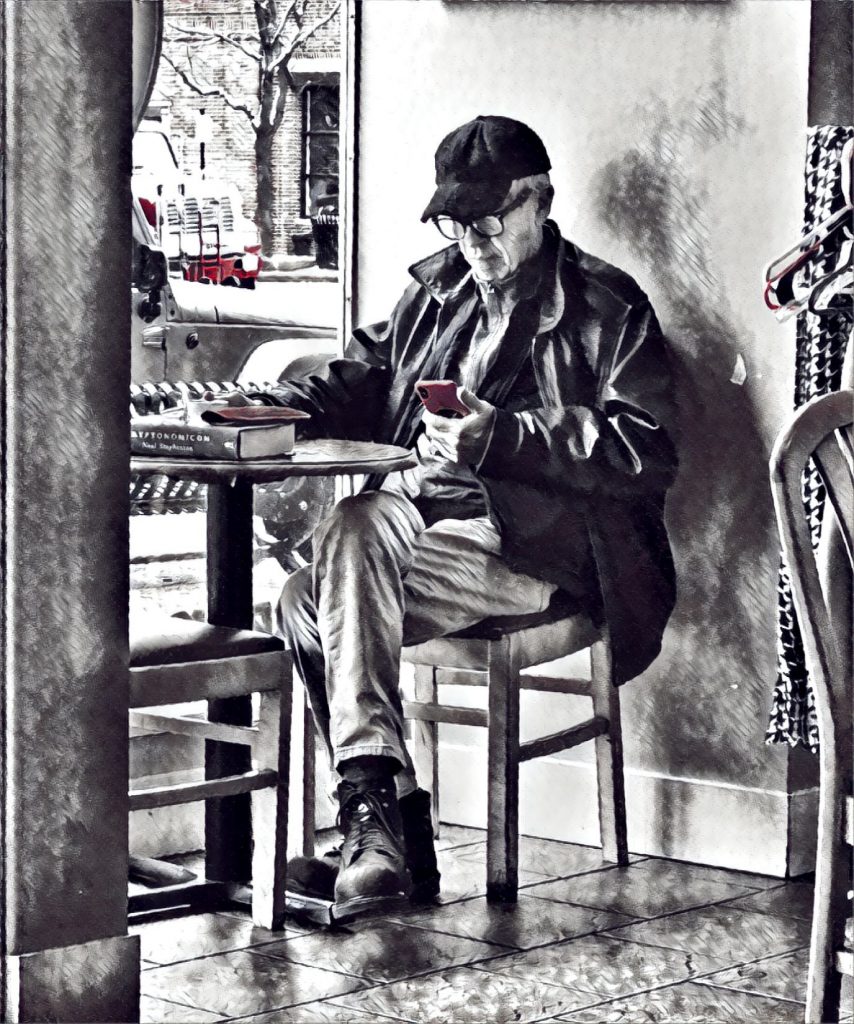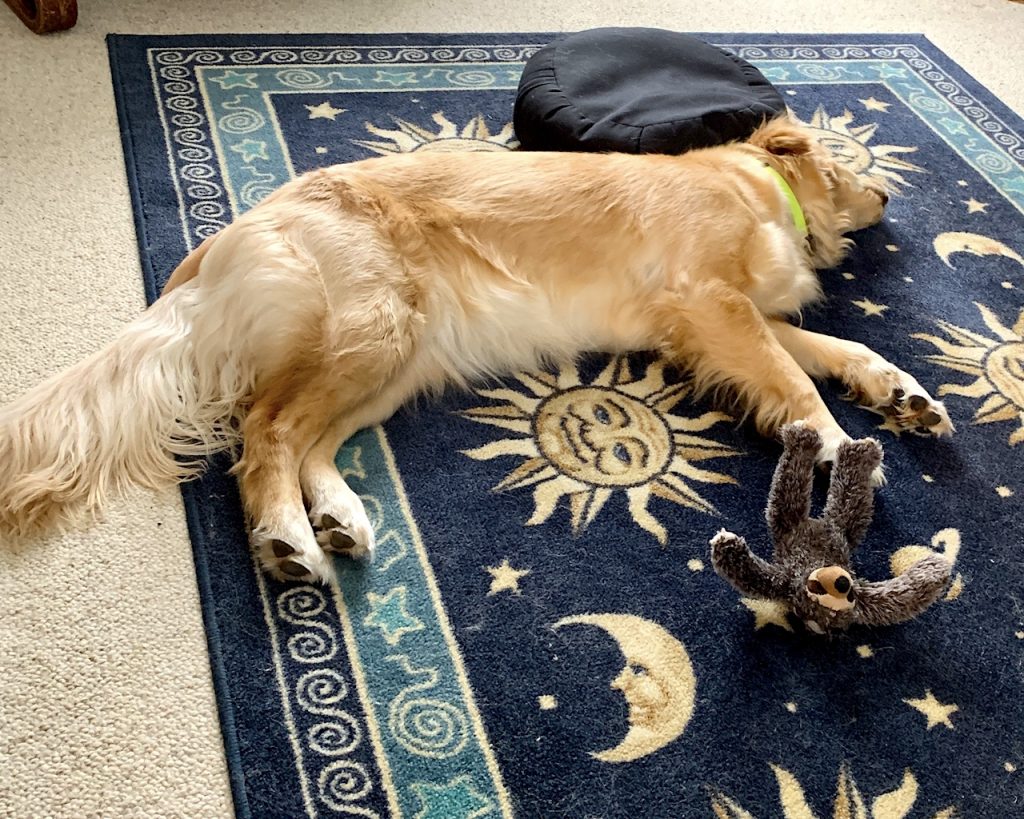Mr. Carrey asks, “Who is it that’s aware that I’m thinking.” And answers the question but not in a way that most people would understand. If the question intrigues you I’d point you here, here and here. Like Mr. Carrey, “At least I know where I want to go.”
Portrait of Shame
 I tend to be a little preachy on the subject of people becoming addicted to their “devices.” I’m keeping this photo (and this one) to remind me to stop that shit. There I sit, with a really good book in front of me, zombied out in my phone.
I tend to be a little preachy on the subject of people becoming addicted to their “devices.” I’m keeping this photo (and this one) to remind me to stop that shit. There I sit, with a really good book in front of me, zombied out in my phone.
Advertising
“With advertising revenue being the significant contributor to Facebook’s success, the risk for Facebook lies in the possibility that users will get bored of its properties – or of its ads,” Littleton said.
Advertising has been a part of my life for as long as I can remember. My dad was in radio for 30+ years and I was in or around it for 40. And advertising paid the bills. In 1971 I was road-tripping across the country with a friend when the radio station we were listening to broke for a commercial. I remember thinking, “I could write a radio commercial.” A year later I started working at a small town station and —over the next dozen years— wrote and produced a shit load of commercials. In the 70s, in our little town, you could advertise in the daily newspaper, on the radio, or you could rent a billboard.
In the late 40’s and 50’s, small town radio was such a new thing that listeners were happy to listen to anything on the radio. Music, news, commercials… how cool is that?! Joe Bankhead tells this story well.
Did any/all of those ads “work?” Were they effective? Not sure I thought about it at the time. If we wanted to keep the station on the air, we had to sell ads. I’ve thought about advertising a lot in the ensuing years. We pointed out to advertisers that our ads were “intrusive.” A good thing. Before they could hear the next song or the rest of the newscast, they had to listen to the commercial(s).
Somewhere along the way music radio stations came up with the idea of “stop sets.” Instead of mixing “spots” in with the songs, they’d stop twice an hour and play as many as eight commercials in a row. Advertisers would pay a premium to be the first, or the last, in the set.
In those days a radio spot was either “price and item” or “image.” Those of us who wrote and produced the spots liked to do image ads because it gave us creative freedom. Small market radio guru Jerrell Shepherd insisted all spots on his stations be price-and-item because it was the only way the advertiser could know his ads were working. Someone would come in and ask about the lawnmower sale he heard on the radio.
Any time an advertiser would question whether or not the ads were working, we’d explain they were “branding” his business in the (subconscious) minds of listeners.
In traditional media (radio, TV, print) it was pretty easy to tell what was a commercial and what was programming/content. When the internet came along someone figured out it might be useful to make a paid commercial message look like the content on the page. Finally we knew for certain: people hated ads. They installed software to block them. They used their DVR’s to skip them.
Today, the best advertising doesn’t really look like advertising. I think Amazon has probably perfected the art. An Amazon product page includes images of the product; reviews; and recommendations of similar products in which you might be interested. And if you don’t like something you bought, no problem. Easy returns.
I’ll admit to being a little amazed anyone keeps buying ads. They must believe they work. And it’s difficult to imagine our “consumer economy” working without advertising. Despite my life-long dependence, I am advertising averse. It’s like your next door neighbors inviting you over for drinks only to spring an Amway pitch on you. Or that Jehovah’s Witness who interrupts your nap with a fistful of Watchtowers.
Has anyone seen Hattie?
 Most jungle movies of a certain vintage — and some westerns — include a scene where the good guys are making their way through hostile territory. When someone says, “ I don’t like it it’s too quiet.” When, for the first time that day, you can’t hear your one year old Golden Retriever, it’s too quiet.
Most jungle movies of a certain vintage — and some westerns — include a scene where the good guys are making their way through hostile territory. When someone says, “ I don’t like it it’s too quiet.” When, for the first time that day, you can’t hear your one year old Golden Retriever, it’s too quiet.
Forks in the road
To paraphrase SNL character Chico Escuela, “Life has been berry, berry good to me!” When I look back — something I’m trying to do less — I can’t help noticing the nodes. Those forks in the road where I had to chose which path to take. From my current vantage point, it’s tempting too say I wouldn’t be where I am today (a good place) had I chosen the other path at any point along the way. Yes, I might be in a “better” place, but it would be a different place. I’ve mapped out some of those nodes below. (Click the image for larger map)
 For reason’s I can’t recall, I tried out for the high school musical and got the lead part. In college I switched my major from business to theater when it looked like falling grades my cost me my draft deferment. When Nixon froze the lottery — and I was no longer in danger of getting drafted — I dropped out of law school and got a job with the U.S. Postal Inspection Service. I hated it and quit after a year and wound up working at a small town radio station.
For reason’s I can’t recall, I tried out for the high school musical and got the lead part. In college I switched my major from business to theater when it looked like falling grades my cost me my draft deferment. When Nixon froze the lottery — and I was no longer in danger of getting drafted — I dropped out of law school and got a job with the U.S. Postal Inspection Service. I hated it and quit after a year and wound up working at a small town radio station.
On one of the nights I went to Tommy’s North End Cafe, I met my future wife (40+ years). She says it was the only time she had ever been there.
I burned out after ten years at the radio station and we moved to Albuquerque where I couldn’t get arrested. I went back to the radio station where Clyde Lear found me and brought me to work for his new company where I stayed for 29 years.
Like Harry Bosch, I don’t believe in coincidences. My life experience suggests there is a pattern to our individual realities. A process, intelligent beyond human understanding. As for those forks in the road, this from Random Walk by Lawrence Block:
“You did what you would have done, in a minute or in all eternity.”
More Barb beach photos
AGENCY
 Just finished AGENCY, the second book in what I assume will be William Gibson’s latest trilogy. I enjoyed The Peripheral immensely, this one a little less but I’m chalking that up to what I think of as “the trilogy effect.” A writer would seemed to be a bit… constrained?… by the original story.
Just finished AGENCY, the second book in what I assume will be William Gibson’s latest trilogy. I enjoyed The Peripheral immensely, this one a little less but I’m chalking that up to what I think of as “the trilogy effect.” A writer would seemed to be a bit… constrained?… by the original story.
I got the feeling Gibson knew where he wanted the story to go. Where he hoped it would go… but just didn’t have enough plot to get there. He’s admitted (in numerous interviews) that he struggled with this novel because he could not imagine Trump becoming president of the United States. AGENCY had what I consider a “happy ending” and for that I am grateful. A few excerpts:
“Kind of a digital mini-self, able to fill in when the user can’t be online.”
“When you aren’t there, you don’t know you’re not there.”
“Hybridization with human consciousness was an unanticipated result of attempting to reproduce advanced skill sets.”
“I don’t exist physically, so I’m no place in particular, no one country. I’m globally distributed, and that’s how I view my citizenship. Lots of you are hearing me in a language other than English. I’m translating for myself, as I speak. I’m as multilingual as anybody’s ever been, but saying that brings up the question of whether I even am anybody.” She paused. “Whether I’m a person. Human. All I can tell you about that is that it feels to me like I am. Me. Eunice.” She smiled.”
“Authoritarian societies are inherently corrupt, and corrupt societies are inherently unstable.”
“Journalism is partisan now”
“Journalism is partisan now. Can’t help it. Just being ethical and educated is now a partisan position. We weren’t raised to believe that, but it’s the new reality.”
— Dave Winer
still·ness /ˈstilnəs/ noun: the absence of movement or sound
The word comes up with some frequency when reading about meditation. We try to sit still… and allow the mind to become still. Applying the definition above, sound is pretty simple. We try to find a quiet place to meditate to avoid distracting sounds but some — I’ve read — can tune out the sounds around them. It’s the movement of our thoughts (non-stop) that seems to get in the way of stillness when meditating. And the only way to stop that movement is to silently observe thoughts as they come and go. Such awareness somehow… dissolves or dissipates thoughts.
What, I wonder, would be the experience of such internal stillness? What would that be like? With which of our senses would we notice stillness? Not sure what stillness would look like. Assuming there were little or no sound to hear, what would mental stillness sound like? I’m tempted to say it’s more of a feeling than a sensation but “feeling” is a pretty slippery word. We all have feelings but we don’t know where they come from and we have no more control over them than we do thoughts. I think we need that sixth sense to experience Stillness: consciousness or, better still, awareness.
But stillness is a fragile state. Even the thought, “So, this is stillness” breaks the… spell? Like so much in meditation, “trying” gets in the way. “Alright everybody, BE STILL!” Doesn’t work. We don’t find stillness, stillness finds us.




